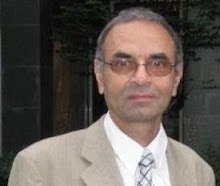I am hoping that the way I interpret the Holy Scriptures others will catch on and do the same. Take for example this line from the bible, I first try to understand what this insight means in religious terms. It means stay away from any bad behavior for it will only result in ruin. Also not only stay away from bad deeds; expose them. Then I take this insight and try to examine it in the light of the mind sciences: psychology, philosophy, common sense etc.
So first I will examine this insight by exploring the mind of the religious prophet who made this statement. Why is he saying this, what results does he want from this statement? What is the insight that he wants to convey? Is there any similar insight in any other religion or from some other prophet. Even from another section of the Holy Scripture? Then I will ask myself another question, 'Has any mind scientist, a philosopher, a psychologist or a wise person said any thing similar and in what context?
Then I will take the religious statement and put it in the context of science, philosophy, psychology, common sense. And then and only then will I interpret the Holy insight by exposing it to as many angles of knowledge contexts as possible. Taking the above statement and examining it from the compound microscope of all connected and relevant angles of different disciplines of knowledge; the best interpretation comes from psychology. The above statement means stay away from all bad deeds and not only avoid bad behavior even expose it. Now this is the surface interpretation. A deeper interpretation from the psychology angle will reveal an even more profound insight.
The key statement from the point of view of the psychologist is, 'but rather expose them.' So the psychologist is stressing the fact that you must expose any plans you may have of doing bad. Not only have nothing to do with your conscious bad plans but also whatever unconscious bad longings you may have - expose them. Why am I saying that the psychologist is talking of the conscious and unconscious level longing? Because every thought is like an iceberg some exposed and mostly hidden. So the psychologist is saying it in the context of; to expose your bad planning/longing at the conscious and unconscious levels. So the psychologist wants you to be free of any bad deeds by removing the very cause of the urge to commit the bad deed. By removing the cause from your unconscious brain you can be free of the darkness. Only when your unconscious brain is free will you have really nothing to do with the fruitless deeds of darkness. Thus by exposing your unconscious bad longings and making them conscious you insure that you will stay away from fruitless bad deeds.
In what context will a philosopher take this very same biblical statement? The key part of the statement for the philosopher is, 'fruitless deeds of darkness...' Translating the philosophical context means the philosopher is saying 'Stay away from the the deeds of darkness because they will bring you losses. Because fruitless means you have this plant or tree which is taking up space, you tender to its needs and you give it time and attention (for remember any deed you commit requires effort, time, action etc.). As the tree is fruitless it means all your time, energy and resources are wasted. Not only does it mean losses; for a philosopher any loss means double loss because not only is it fruitless but consider the extra loss of the fruitful behavior gains that are also missing.
In the context of the scientist this statement means you will reap what you will sow! If you commit bad deeds the results will also be bad so stay away from bad deeds.
From the point of view of the wise person well the wise person's angle/context is the same as the religious prophets angle because at the highest pure humanness level the values of a wise person and those of the religious prophet are the same!
So please take passages/insights from the Holy Books and put them under the combined microscope of all disciplines of knowledge! Also please take insights from the sciences and put them in the context of the wise man/religious prophet.
Subscribe to:
Post Comments (Atom)

No comments:
Post a Comment